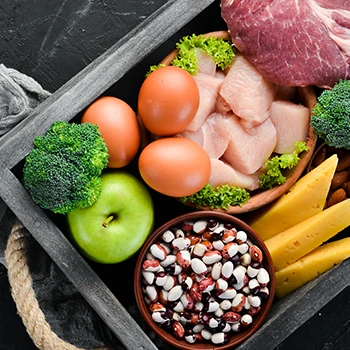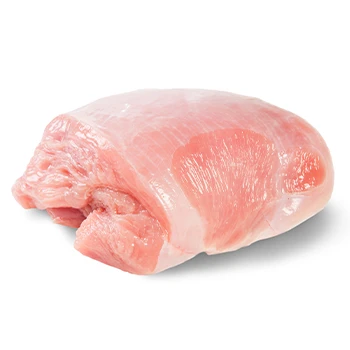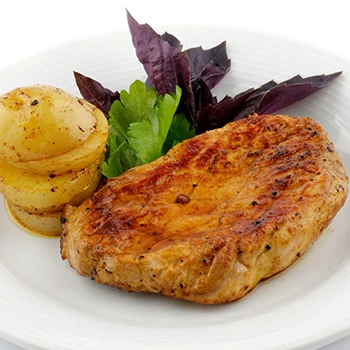Whether you’re trying to lose weight or gain muscle, your body needs protein to sustain itself and grow stronger. And trying to build muscle without eating protein is like driving a car without fuel: you’re not going anywhere.
As a health and performance coach with over a decade of experience helping clients with their muscle-building goals, I’ve learned that not all protein sources are created equal. Some sources support muscle growth better than others.
So, let’s go ahead and take a look at some of the best sources of protein to help you build muscle.
Quick Summary
- To build muscle effectively, incorporating high-protein foods like chicken breast, yellowfin tuna, and Greek yogurt into your diet is essential.
- The article emphasizes the importance of a variety of protein sources, including animal-based, plant-based, and dairy-based proteins, each offering unique benefits for muscle growth.
- According to one of the studies from the National Center for Biotechnology Information website, studies both in vivo and in vitro have shown that leucine at a very high dose can stimulate muscle protein synthesis.
- In my view, the diversity of protein sources discussed in the article is crucial, as it caters to different dietary preferences and needs, making muscle-building accessible and effective for everyone.
What Do You Mean by Good Protein Sources?

By good protein sources, we mean protein-rich foods that are easily digestible and high in leucine.
Easily digestible protein sources contain amino acids that your body can digest, absorb, and use for muscle-protein synthesis without any issues.
Leucine content is the other essential feature of a good protein source. Based on one of the studies found on the PubMed website, leucine is an essential and highly potent amino acid that stimulates muscle protein synthesis [1].
There is a broad range of options for complete protein sources to choose from.
The three main groups of protein sources are:
- Animal-based Protein
- Plant-based Protein
- Dairy-based Protein
Dairy does fall under the animal-based umbrella, but it definitely deserves its own category, and we’ll explain why later on.
Let’s look into some high-quality protein sources in each of these groups.
7 Best Animal Sources

The following list contains some of the best high-protein foods from animal sources. Most of these animal-based protein foods pack between 25–30 grams of protein per serving.
1. Chicken Breast
Protein content (per 100 g): 31 grams
Based on my experience, this is one of the staples of muscle growth and is considered the holy grail of protein among bodybuilders. It has more grams of protein per serving than most foods.
It contains high amounts of B vitamins, especially niacin and vitamin B6, all of which are necessary for improved physical activity and muscle growth [2].
One of the studies from the National Center for Biotechnology Information website shows that a high-protein diet with chicken may also help with fat loss [3].
2. Yellowfin Tuna
Protein content (per 100 g): 29 grams
Tuna is one of the most easily-digestible and highest-quality proteins you can consume. It's also an excellent source of vitamin B and selenium (an excellent antioxidant) [4].
What makes tuna an especially sought-after food is that it packs a lot of protein and is super easy to digest.
That’s why my clients who have a lighter stomach tend to prefer it as their staple source of protein to maximize muscle growth.
You should keep in mind, though, that it’s a big fish which usually means higher mercury content, so try not to overdo it.
3. Turkey Breast

Protein content (per 100 g): 29 grams
Like chicken, turkey breast is one of the leanest meats and contains almost no fat.
It's an excellent source of niacin (an important B vitamin), which helps convert carbohydrates and fats into energy [5].
What's also great about eating turkey breast is that it's low in calories, which allows you to increase your daily protein intake without having to worry about extra calories.
4. Lean Beef
Protein content (per 100 g): 26 grams
Besides chicken breast, lean beef is one of the most popular sources of protein and the best source among red meats. In addition to protein, it's packed with creatine, minerals, and B vitamins [6] [7].
Research suggests that eating lean beef can help build muscle mass from weight training efficiently [8].
Based on our tests, we highly recommend going for above 90% lean beef. That's because you get more protein and fewer calories per serving from leaner beef.
5. Pork Tenderloin

Protein content (per 100 g): 26 grams
This lean cut of pork meat is known to have similar muscle-building effects as beef and chicken [9].
Like other animal products, pork is rich in B vitamins, thiamine, niacin, riboflavin, and pyridoxine.
Tenderloin is a better choice than other cuts of pork because it's lower in fat, higher in protein, and richer in B vitamins and selenium [10].
And compared to other red meats, pork is richer in thiamine, which is essential for concentration and memory [11].
6. Sockeye Salmon
Protein content (per 100 g): 25 grams
For those who don't like the taste of tuna, salmon is a great, albeit expensive dietary alternative for your lean muscle-building goals.
Not only does it taste better, but it’s loaded with omega-3 fatty acids and many essential B vitamins [12]. Omega-3 fatty acids can help with muscular health and increase muscle size [13].
The only downside about sockeye salmon is that it doesn’t contain as much protein per serving as tuna.
7. Eggs
Protein content (per 100 g): 13 grams
Eggs are the most cost-effective source of high-quality protein. They contain micronutrients like B vitamins, choline, and healthy fats [14].
Eggs contain around 0.5 g of leucine per serving (a fairly decent amount), and the yolks are very rich in micronutrients [15].
Compared to other animal sources, eggs are super easy to prepare and consume, making them a very convenient source of protein intake for muscle gain.
“Despite common misconceptions, whole egg yolks are healthy and studies even suggest they can prevent certain chronic conditions and diseases.”
- Dr. Barbara R. Edwards, MD, MPH, Physician
3 Best Dairy Sources

Dairy plays a vital role in the world of protein supplementation, but it isn’t only beneficial as a distilled supplement form but as a source of micronutrient-rich real food as well.
The following is a list of high-protein foods from dairy sources. If you’re lactose intolerant, you might want to avoid these foods.
1. Cottage Cheese
Protein content (per 100 g): 11 g
One cup of cottage cheese delivers 40% of your daily vitamin B12 and selenium needs and half a day's phosphorus [16]. It's also rich in calcium and vitamin A [17].
Cottage cheese was a favorite among our clients, particularly because it helped them lose weight and build muscle [18].
2. Greek Yogurt
Protein content (per 100 g): 10 g
Greek yogurt is known to contain double the amount of protein as regular yogurt, making it an ideal dairy option for building muscle mass [19].
Since it’s a slow-digesting protein, it makes for a perfect snack before bedtime [20].
3. Whey Protein Powder
Protein content (per 100 g): ~ 30 grams (whey concentrate)
Whey protein is the most popular and convenient protein source for most athletes.
Contrary to popular belief, whey protein powder is not a meal replacement. It’s only meant to supplement your protein intake for the day.
Whey protein is clean and fast-digesting, and most of its calories come from protein, especially if you opt for the whey isolate form.
3 Best Plant Sources

The following is a list of some of the most protein-rich foods from plant sources.
Although these plant-based protein sources don’t pack as much protein as animal sources, they’re rich in essential amino acids and other nutrients.
1. Soybeans
Protein content (per 100 g): 12.35 grams
Soy protein is one of the most underrated protein sources which can be also found in .
Soybeans contain a good deal of protein per serving and are a great source of iron, phosphorus, vitamin K, and other essential amino acids [21].
2. Chickpeas
Protein content (per 100 g): 19 grams
Chickpeas are a great source of protein and carbs. At 19 grams of protein per serving, they’re perfect for vegan bodybuilders and fitness enthusiasts.
Apart from being a good vegan protein source, chickpeas can aid digestion, control blood sugar, lower cholesterol, and strengthen your bones [22].
3. Quinoa
Protein content (per 100 g): 4.4 grams
Although it doesn’t pack much protein per serving, we added quinoa to the list because it’s a popular superfood. This seed is a complete protein that contains all nine essential amino acids, giving it great muscle-building potential.
It contains a generous amount of phosphorus and magnesium [23]. The latter plays a crucial role in the functioning of your muscles and eyes [24].
What Protein Sources Are Best for Optimal Muscle Gain?

Animal-based protein sources and slow-digesting protein are the best muscle-building foods, based on my research and experience.
Animal-based protein typically contains higher levels of leucine and has better digestibility — the two qualities that make a protein source good [25].
Additionally, research shows that a plant-based protein source cannot stimulate protein synthesis response as well as an animal source [26].
With regard to slow-digesting protein, research suggests that it can elevate protein synthesis for a longer time compared to fast-digesting proteins.
Slow-digesting proteins include casein protein powder and foods high in casein, like most dairy products.
FAQs
How Much Protein Do I Need to Consume to Gain Muscle?
To gain muscle, you need to consume 0.7 to 1.0 grams of protein per pound of body weight (1.6 to 2.0 grams per kilogram).
For best results, you should incorporate weight training to achieve optimal muscle growth.
What Are the Most Protein-Friendly Diets?
The Stillman and ketogenic diets are the most protein-friendly. Both focus on the consumption of high protein foods and avoiding carbohydrates.
What Are Some Unhealthy Protein Sources to Avoid?
Some unhealthy protein sources to avoid are processed meats, grain-fed red meats, low-quality protein powders, or any sources with trans fats and sugars.
The side-effects of eating these sources come from their harmful ingredients and not the protein itself.
What Role Do Micronutrients Play in Muscle Gain?
Micronutrients, such as vitamins and minerals, are crucial for muscle repair and growth. They aid in various bodily functions, including protein synthesis, energy production, and muscle contraction, which are essential for effective muscle building.
How Does Hydration Impact Muscle Growth?
Proper hydration is key to muscle growth as it facilitates nutrient transport and helps maintain optimal muscle function. Dehydration can lead to decreased strength, reduced endurance, and slower recovery, hindering muscle development.
What Are Effective Plant-Based Protein Sources for Muscle Gain?
Plant-based proteins like lentils, chickpeas, quinoa, and tofu are excellent for muscle gain. They provide essential amino acids and are often packed with fiber and other nutrients beneficial for overall health and muscle growth.
Why Is the Timing of Protein Intake Important for Muscle Building?
Consuming protein either before or after a workout can significantly enhance muscle protein synthesis. This timing ensures that adequate protein is available for muscle repair and growth during the recovery phase.
How Does Sleep Affect Muscle Recovery and Growth?
Sleep is vital for muscle recovery and growth as it is the time when the body repairs and builds muscle tissue. Lack of adequate sleep can impair muscle recovery and reduce the effectiveness of muscle-building efforts.
Increase Your Muscle Gains With Protein
While high-protein foods should be your primary source of protein consumption, there are times when it’s hard to reach your daily requirement.
Adding high-quality protein powder to your supplements can help you avoid missing out on your daily protein requirements.
After extensively testing many products, we hand hand-picked these based on the best results. They contain all-natural and premium ingredients that’ll help you build muscle, increase strength levels, and recover quickly after a workout.
Check out our list and pick yours today.
References:
- https://pubmed.ncbi.nlm.nih.gov/15930468/
- https://medlineplus.gov/bvitamins.html
- https://pubmed.ncbi.nlm.nih.gov/20809267/
- https://www.medindia.net/health/diet-and-nutrition/health-benefits-of-tuna-fish.htm
- https://pubmed.ncbi.nlm.nih.gov/25429652/
- https://jissn.biomedcentral.com/articles/10.1186/s12970-017-0173-z
- https://fdc.nal.usda.gov/fdc-app.html#/food-details/174031/nutrients
- https://pubmed.ncbi.nlm.nih.gov/24477043/
- https://www.ncbi.nlm.nih.gov/pubmed/24534884
- https://www.webmd.com/diet/pork-good-for-you
- https://www.webmd.com/vitamins-and-supplements/health-benefits-of-vitamin-b-1
- https://fdc.nal.usda.gov/fdc-app.html#/food-details/173686/nutrients
- https://www.ncbi.nlm.nih.gov/pubmed/25285409
- https://fdc.nal.usda.gov/fdc-app.html#/food-details/171287/nutrients
- https://www.self.com/
- https://www.webmd.com/diet/health-benefits-cottage-cheese
- https://www.medicalnewstoday.com/articles/318400
- https://pubmed.ncbi.nlm.nih.gov/22642074/
- https://fdc.nal.usda.gov/fdc-app.html#/food-details/171309/nutrients
- https://pubmed.ncbi.nlm.nih.gov/28536184/
- https://fdc.nal.usda.gov/fdc-app.html#/food-details/174271/nutrients
- https://www.webmd.com/food-recipes/health-benefits-chickpeas
- https://fdc.nal.usda.gov/fdc-app.html#/food-details/168917/nutrients
- https://ods.od.nih.gov/factsheets/Magnesium-Consumer/
- https://www.ncbi.nlm.nih.gov/pmc/articles/PMC6723444/
- https://link.springer.com/article/10.1007/s40279-019-01053-5
About The Author
You May Also Like






